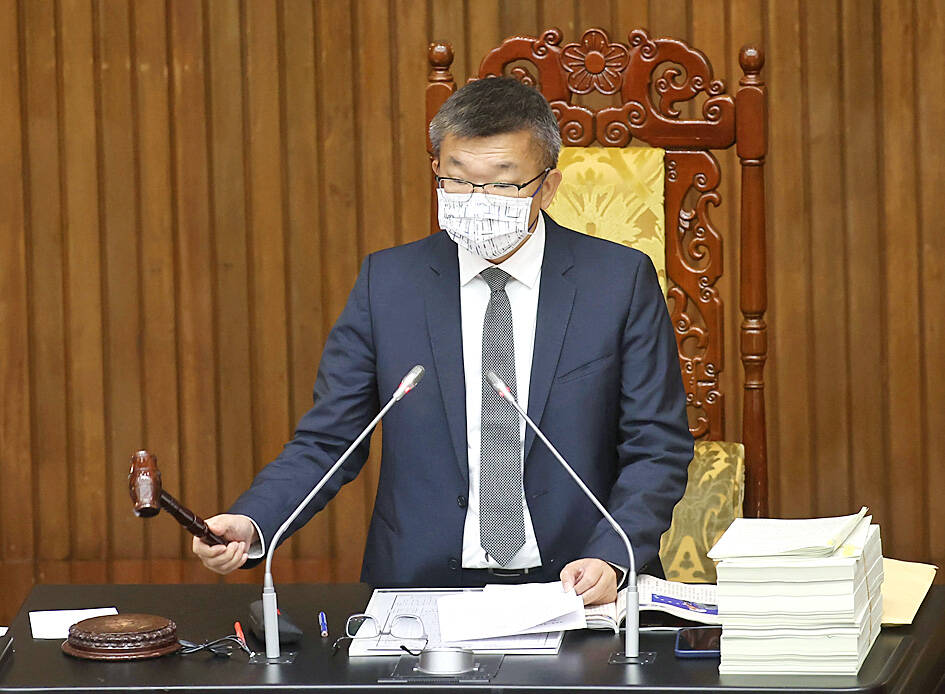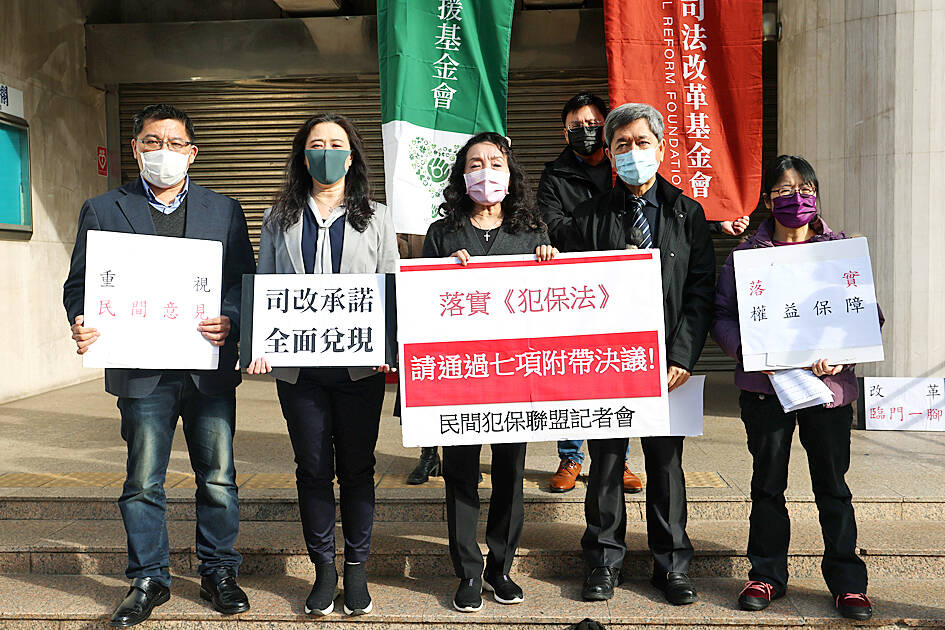The legislature yesterday passed draft amendments to curb the use of sexual images and video that would make the production and spread of fake or manipulated images and video for profit a crime punishable by up to seven years in prison.
The draft amendments to the Criminal Code include an additional article dedicated to a new form of crime using artificial intelligence — deepfakes — which involve inserting the likeness of a person into an existing image or video.
The draft amendments were proposed after the arrest in 2021 of a Taiwanese YouTuber for making and selling “deepfake” pornographic videos of dozens of prominent women, including politicians.

Photo: CNA
The approved legislation includes a provision stipulating that producing sexual material involving images or video footage of another individual without that person’s consent is subject to a maximum sentence of three years in prison, while the unauthorized distribution of such material could result in a prison term of six months to five years.
Anyone found guilty of distributing such content for profit faces an additional sentence of up to one half of the prescribed sentence, the amendment states.
The bill also includes a provision that anyone convicted of producing sexual images or video of another individual through the use of threats or violence faces up to five years in prison and one to seven years if distribution is involved.

Photo: CNA
Without the consent of the party involved, those who reproduce, distribute, broadcast, deliver, display or use other methods to display sexual images of others would be subject to a maximum sentence of five years in prison and a fine of up to NT$500,000 (US$16,289).
The draft also stipulates that those who produce or disseminate deepfakes face a sentence of up to five years in jail and, if the offense is profit-related, up to seven years.
Kaohsiung City Councilor Huang Jie (黃捷) said the passing of the law is the “best New Year’s gift” to victims of sexual exploitation, and thanked lawmakers for making it happen.
The law could be improved with regard to curbing “digital sexual violence,” including by creating mechanisms to immediately remove illegal images and video from Internet platforms, she added.
Lawmakers also passed a third reading of amendments to the Crime Victim Protection Act (犯罪被害人權益保障法).
The amendments expand the protections offered to victims of new forms of crime, including revenge porn and secretly filmed sexual content.
The changes authorize judicial authorities to impose restraining orders against suspects for up to two years during the trial period.
Compensation for next of kin in manslaughter or murder cases would be set at NT$1.8 million, while victims of crimes resulting in severe injuries would receive NT$800,000 to NT$1.6 million, and victims of sexual assault would receive NT$100,000 to NT$400,000.
New Power Party Legislator Claire Wang (王婉諭) said that “this amendment has … expanded the social safety net for victims of crime, including more programs to better protect the victims.”
“However, government agencies must allocate consistent, long-term funding. If not, these are merely administrative orders, without actual legal enforcement,” she said, adding that the current funding is insufficient.
Groups protested outside the Legislative Yuan, including representatives from the Association for Victims Support, the Judicial Reform Foundation, the Taipei Women’s Rescue Foundation and the Taiwan Children’s Rights Association.
Taiwan Children’s Rights Association founder Wang Wei-chun (王薇君) said that the changes do not go far enough.
“I especially cannot accept that lawmakers imposed a cap on the compensation for [murder] at NT$1.8 million. This is not sufficient for many families experiencing economic hardship,” she said.
Additional reporting by Jason Pan

The Central Election Commission has amended election and recall regulations to require elected office candidates to provide proof that they have no Chinese citizenship, a Cabinet report said. The commission on Oct. 29 last year revised the Measures for the Permission of Family-based Residence, Long-term Residence and Settlement of People from the Mainland Area in the Taiwan Area (大陸地區人民在台灣地區依親居留長期居留或定居許可辦法), the Executive Yuan said in a report it submitted to the legislature for review. The revision requires Chinese citizens applying for permanent residency to submit notarial documents showing that they have lost their Chinese household record and have renounced — or have never

A magnitude 5.6 earthquake struck off the coast of Yilan County at 12:37pm today, with clear shaking felt across much of northern Taiwan. There were no immediate reports of damage. The epicenter of the quake was 16.9km east-southeast of Yilan County Hall offshore at a depth of 66.8km, Central Weather Administration (CWA) data showed. The maximum intensity registered at a 4 in Yilan County’s Nanao Township (南澳) on Taiwan’s seven-tier scale. Other parts of Yilan, as well as certain areas of Hualien County, Taipei, New Taipei City, Taoyuan, Hsinchu County, Taichung and Miaoli County, recorded intensities of 3. Residents of Yilan County and Taipei received

Taiwan has secured another breakthrough in fruit exports, with jujubes, dragon fruit and lychees approved for shipment to the EU, the Ministry of Agriculture said yesterday. The Animal and Plant Health Inspection Agency on Thursday received formal notification of the approval from the EU, the ministry said, adding that the decision was expected to expand Taiwanese fruit producers’ access to high-end European markets. Taiwan exported 126 tonnes of lychees last year, valued at US$1.48 million, with Japan accounting for 102 tonnes. Other export destinations included New Zealand, Hong Kong, the US and Australia, ministry data showed. Jujube exports totaled 103 tonnes, valued at

BIG SPENDERS: Foreign investors bought the most Taiwan equities since 2005, signaling confidence that an AI boom would continue to benefit chipmakers Taiwan Semiconductor Manufacturing Co’s (TSMC, 台積電) market capitalization swelled to US$2 trillion for the first time following a 4.25 percent rally in its American depositary receipts (ADR) overnight, putting the world’s biggest contract chipmaker sixth on the list of the world’s biggest companies by market capitalization, just behind Amazon.com Inc. The site CompaniesMarketcap.com ranked TSMC ahead of Saudi Aramco and Meta Platforms Inc. The Taiwanese company’s ADRs on Tuesday surged to US$385.75 on the New York Stock Exchange, as strong demand for artificial intelligence (AI) applications led to chip supply constraints and boost revenue growth to record-breaking levels. Each TSMC ADR represents